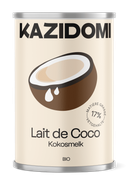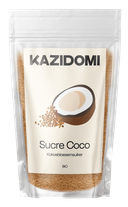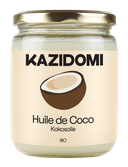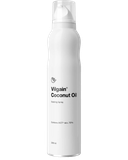Coconut oil: a natural beauty ally – but is it for everyone?
Organic coconut oil is a natural, versatile ingredient that has become a staple in beauty routines. Used for centuries for its nourishing, moisturizing and protective properties, it is now widely used to care for the skin, hair, and even teeth.
But is it really suitable for everyone? While some praise its hydrating and anti-aging powers, others warn about its comedogenic effect, especially on oily or blemish-prone skin. So, should it be adopted without hesitation or used with caution? Discover the benefits and limitations of coconut oil for the face, as well as the best ways to include it in your beauty routine.
The benefits of coconut oil for the skin
Coconut oil is rich in vitamins, minerals and fatty acids that offer multiple effects on the skin. Here's why it’s so popular among those who prefer natural care.
A powerful moisturizer
Thanks to its high content of lauric and linoleic acid, coconut oil helps strengthen the skin’s barrier. It forms a protective layer that prevents water loss, keeping the skin soft and hydrated. Ideal for dry or tight skin, it can be used as a nourishing treatment after showering.
It can also be combined with shea butter to make an ultra-nourishing balm for very dry areas such as elbows, knees or brittle nails.
A natural anti-aging agent
Rich in vitamin E and other antioxidants, coconut oil helps fight free radicals responsible for premature aging. However, unlike other oils such as rosehip or argan oil, it does not stimulate collagen production directly.
Its anti-aging effect comes mainly from its moisturizing and protective action, which helps preserve the skin’s elasticity and softness by limiting water loss.
Soothing for irritated skin
Thanks to its anti-inflammatory and nourishing properties, coconut oil is useful for soothing irritated skin. It calms redness and tightness after sun exposure, shaving or waxing, and helps restore skin comfort.
It is also used to relieve certain skin conditions such as eczema, psoriasis and dermatitis, due to its content in lauric acid and essential fatty acids. These help reinforce the skin barrier and reduce dehydration. Its film-forming effect creates a protective shield against external aggressors, reducing discomfort and itching.
In case of very sensitive or allergy-prone skin, it is recommended to test coconut oil on a small area before broader application, as some reactive skin types may not tolerate it well. For severe eczema, it can be combined with other soothing plant oils such as calendula or sweet almond oil.
An effective antibacterial agent
Thanks to its high content of lauric acid, a fatty acid with antimicrobial and antifungal properties, coconut oil helps combat certain skin infections and promotes healing of minor wounds. Lauric acid acts by disrupting bacterial and fungal membranes, limiting their proliferation.
It is particularly useful for soothing superficial cuts and chapped skin. Applied in a thin layer, it protects the skin while speeding up regeneration. Its purifying effect can also help with fungal infections, cold sores or irritation caused by repeated friction.
Is coconut oil suitable for all skin types?
Although coconut oil has many virtues for the skin, it is not suitable for every skin type. While highly appreciated for its moisturizing and repairing properties, its rich and occlusive texture may be problematic for some.
Not recommended for oily and acne-prone skin
Coconut oil is considered highly comedogenic, with a rating of 4 out of 5. This means it tends to clog pores, preventing the skin from breathing and encouraging blackheads and breakouts. For oily or acne-prone skin, its use may worsen imperfections.
Moreover, although its antibacterial action might seem helpful against pimples, its occlusive nature blocks sebum from evacuating, which can cause subcutaneous inflammation. If you have combination to oily skin, it is better to opt for lighter, non-comedogenic oils such as:
- Jojoba oil, which regulates sebum production without clogging pores
- Hazelnut oil, which tightens pores and balances the skin
- Grapeseed oil, known for its purifying and antioxidant properties
A risk for sensitive and reactive skin
Sensitive or allergy-prone skin may react poorly to coconut oil. Although natural, it contains compounds that can trigger skin reactions, redness or itching in those with a fragile skin barrier.
Its thick texture may also create an uncomfortable, heavy feeling on very reactive skin, particularly for those with rosacea or chronic irritation. If your skin is sensitive, it is recommended to perform a patch test before applying it to the entire face.
Not advised for inflammatory skin conditions
If you suffer from rosacea, seborrheic dermatitis or severe eczema, coconut oil may worsen symptoms. Its occlusive effect may prevent proper detoxification and encourage the growth of certain bacteria responsible for flare-ups.
In these cases, it is better to use gentler, anti-inflammatory oils such as:
- Calendula oil, known for its calming and regenerating properties
- Sweet almond oil, ideal for soothing irritation and redness
- Hemp oil, which strengthens the skin barrier and reduces inflammation
How to use coconut oil on the face properly
To benefit from coconut oil without overwhelming your skin, here are a few precautions:
- Apply a thin layer on clean, slightly damp skin to improve absorption and avoid greasy residue
- Use it occasionally rather than daily, especially if your skin is combination or blemish-prone
- Blend it with lighter oils, such as argan or rosehip oil, for a more balanced treatment
- Always test on a small area first to check your skin’s reaction before regular use
- Choose virgin, cold-pressed, organic coconut oil for the highest nutrient and essential fatty acid content






